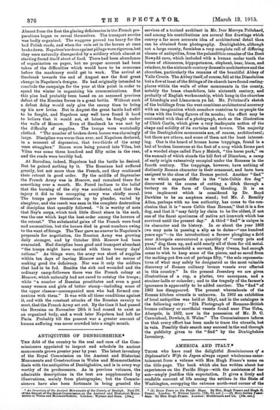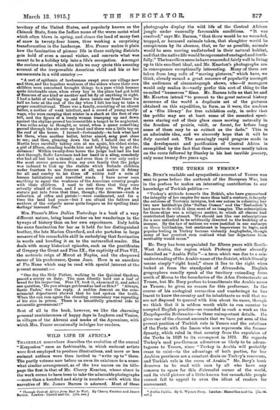AMERICA AND ITALY.* THOSE who have read the delightful Reminiscences
of • Diplomatist's Wife in .Tapan always expect wholesome enter- tainment from a volume with Mrs. Hugh Fraser's name on the title-page. The book which she has written about her experiences on the Pacific Slope—with the assistance of her son—amply justifies this expectation. It gives a lively and readable account of life among the settlers in the State of Washington, occupying the extreme north-west corner of the
• (I) Sense ./eam_m_tho Pastfic sure. Et Bra. Hugh Fraser and Huh C. dFiTanayltr,i. "F'rear:X ItZtni-Pitat0hTrtsoet In—tuagUaTIrrIrt.f*d.r7 territory of the United Stater, and popularly known as the Chinook State, from the Indian name of the warm moist wind which often blows in spring, and clears the land of many feet of snow in twenty-four hour; than working a surprising transformation in the landscape. Mrs. Fraser makes it plain how the fascination of pioneer life in these outlying districts gets hold of even a casual visitor, and converts what was meant to be a holiday trip into a life's occupation. Amongst the curious stories which she tells we may quote this amazing account of the irrepressible American child and his or her amusements in a wild country "A sort of epidemic of lawlessness swept aver our village now and then, and the hopeless weakness of the elders where their own children were concerned brought things to apses which became quite intolerable once, when every boy in the place had got hold of firearms of one kind or another and let fly at anything in eight. I had a habit of walking up and down inside our front fence for half an hour at the end of the day when I felt too lasy to take a proper constitutional. There was a family, consisting of an absent father, another of weak intellect, and a crowd of young wally- wags, who were camping that winter in a shack at the foot of our kill, and the figure of a lonely woman tramping up and down against the skyline proved too irresistible a target to be neglected. I was miles away in thought, as usual, when a queer something purred through the air over my head and there woe a little tap on the roof of the house. I turned—fortunately—to look what had tit there, when another Nina, better aimed, sang past close to me ; mid then, glancing down the lull, I beheld one of the Martin boys carefully taking aim at mo again, his eldest sister, a girl of fifteen, standing beside him and helping him to get tho distance ! Within twenty-four honvo the judge had had his hat shot through, Sadie Lawrence had her hand in a sling, somebody eke had all but lost a thumb ; and even then it waa only under the most severe pressure from my own family that the judge was induced to look up the statute which forbade children under fourteen to use firearms at all, and makes it felony for all and sundry to let them off within half a mile of human habitations and travelled roads. I have never seen anything to equal the weakness of the American country people with their children. I used to tell them that they were actually afraid of them, and I am sure they are. We got the statute put into force that time, though ; the firearms—such a collection of rifles and pistols l—were confiscated, and for a time the land bad peace—but I am afraid the fathers and mothers of the culprits never quite forgave us for spoiling their darlings" innocent fun."
Mrs. Fraser's More Italian Yesterdays is a book of a very different nature, being based rather on her wanderings in the byways of history than on her own experiences. Italy holds the same fascination for her as it held for her distingnished brother, the late Marion Crawford, and she partakes in large measure of his remarkable skill in embodying that fascination in words and handing it on to the untravelled reader. She deals with many historical episodes, such as the pontificates of Gregory the Great and Pius IX., the captivity of Pius VII,, the meteoric reign of Murat at Naples, and the chequered eareer of his predecessor, Queen Joan. Here is an anecdote of Pio Nono which may be read with special interest at the present moment One day the Holy Father, walking in the Quirinal Gardens, passed a sentry on duty. The man silently held out a loaf of bread for his inspection. Pius IX. took it, examined it, and asked one question, • Do you always get bread as bad as this 1'Always, Santo Padre,' was the reply. A sudden descent on the com- missariat department showed that he bad spoken the truth. When the sun rose again the cheating commissary was repeating of his sins in prison. There is a beautifully practical side to autocratic government i•••
Best of all in the book, however, we like the charming personal reminiscences of happy days in Leghorn and Venice, in villages of the Abruzzi and nooks of the Apenninea, with which Mrs. Fraser occasionally indulges her readers,



































 Previous page
Previous page